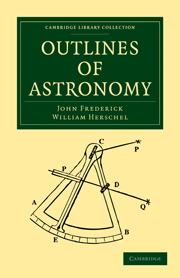CHAPTER XV
Published online by Cambridge University Press: 05 July 2011
Summary
(777.) Besides the bodies we have described in the foregoing chapters, the heavens present us with an innumerable multitude of other objects, which are called generally by the name of stars. Though comprehending individuals differing from each other, not merely in brightness, but in many other essential points, they all agree in one attribute, — a high degree of permanence as to apparent relative situation. This has procured them the title of “fixed stars;” an expression which is to be understood in a comparative and not an absolute sense, it being certain that many, and probable that all, are in a state of motion, although too slow to be perceptible unless by means of very delicate observations, continued during a long series of years.
(778.) Astronomers are in the habit of distinguishing the stars into classes, according to their apparent brightness. These are termed magnitudes. The brightest stars are said to be of the first magnitude; those which fall so far short of the first degree of brightness as to make a strongly marked distinction are classed in the second; and so on down to the sixth or seventh, which comprise the smallest stars visible to the naked eye, in the clearest and darkest night.
- Type
- Chapter
- Information
- Outlines of Astronomy , pp. 519 - 553Publisher: Cambridge University PressPrint publication year: 2010First published in: 1864

